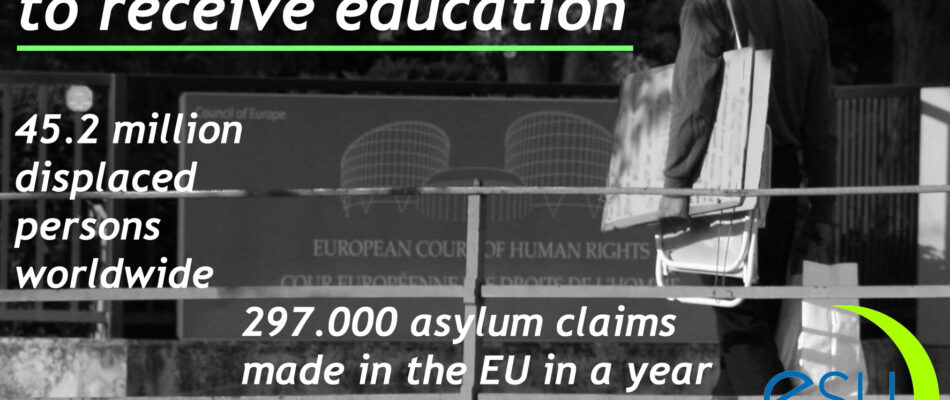
Refugees and asylum seekers must have access to education
BRUSSELS – The European Students’ Union (ESU) expresses its solidarity with all refugees, asylum-seekers, internally displaced persons (IDPs) and stateless persons around the world that are denied access to education. ESU urges governments in Europe to take more responsibility in protecting vulnerable societies to make sure that refugees enjoy human rights.
“If we want to combat prejudice, eliminate socio-economic exclusion and ethnic and religious tensions, we have to ensure that refugees can attend courses at educational institutions. Schools and higher education institutions should reflect the diverse demography of the population and make their studies available to all people. Education is a key to the integration of refugees and a more inclusive society,” says Taina Moisander, ESU’s Vice-Chairperson.
Education improves lives
The Refugee Support Network has collected testimonies of refugee students that speak of education as the most positive thing in their lives, enabling them to focus on the future instead of the past. A research paper from Education International has also revealed that many refugees do consider their children’s education to be very important in order to create a stable livelihood.
“Refugees face many obstacles in accessing education and higher education even though they are extremely motivated to complete their studies. Most of the students who are refugees are classified as international students, making them subjects to high tuition fees. Moreover, because of their refugee status, their cases are often treated with delays in relation to student support,” Moisander explains.
ESU believes that major problems still exist within education systems in recognising the difference between long-term and short-term refugees, as many people are unable to return to their homes. The value of education in improving the future prospects of all refugees has to be recognised and promoted.
Responsible for refugees’ wellbeing
ESU’s statement is released in relation to the World Refugee Day that is held on 20 June to raise awareness about the conditions of those people that have been forced to flee their homes because of war, conflict or persecution. According to numbers from UNHCR, 45.2 million people were forcibly displaced by the end of 2012. In the same year, the 27 Member States of the European Union registered 297 thousand new asylum claims. These figures represent significant increases when compared to the previous year.
“The rights of asylum seekers and refugees, including access to education, are often neglected as they are confined in detention centres waiting for authorities to process their applications. Meanwhile, asylum seekers are in a limbo state where they do not have access to education or social protection and are treated as criminals for simply being persecuted in their own country,” says Moisander.
ESU would like to remind those 142 states that are signatories to the 1951 Refugee Convention and 1967 Protocole protecting refugees’ rights of their responsibility to ensure that refugees have access to education, housing, social protection, judiciary system and that they can move freely.

— END —
For more information, please contact:
Taina Moisander, ESU Vice-chairperson: +32/479.591.499 // taina@esu-online.org or Robert Hlynur Baldursson, ESU Communications Manager: +32/473.669.894 // robert@esu-online.org

The European Students’ Union, headquartered in Brussels, is the umbrella organisation of 47 national unions of students from 39 European countries. ESU represents and promotes the educational, social, economical and cultural interests of students at the European level. Through its member unions, ESU represents over 11 million students in Europe. To find out more about ESU, follow us on Twitter @ESUtwt, check out or Facebook page or visit www.esu-online.org. ESU celebrates its 30th anniversary in 2012.
